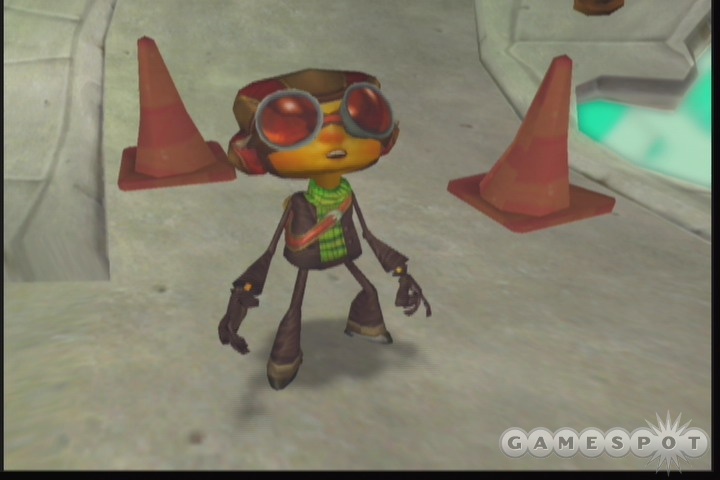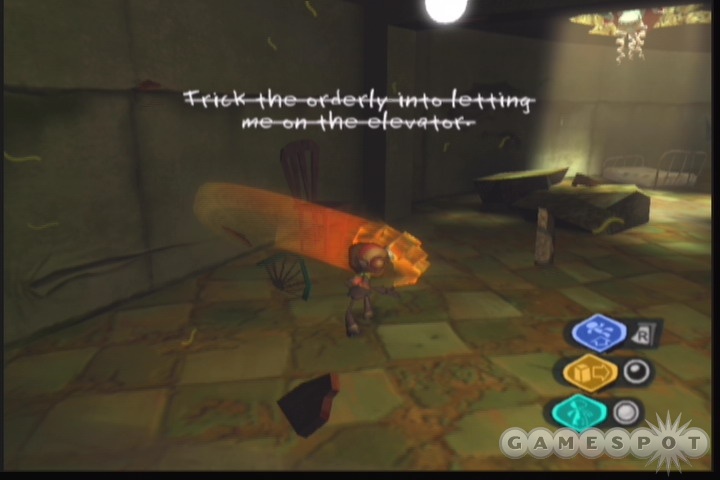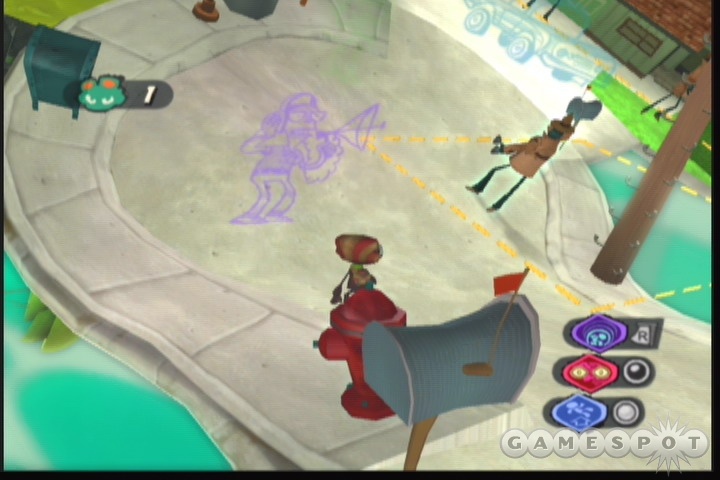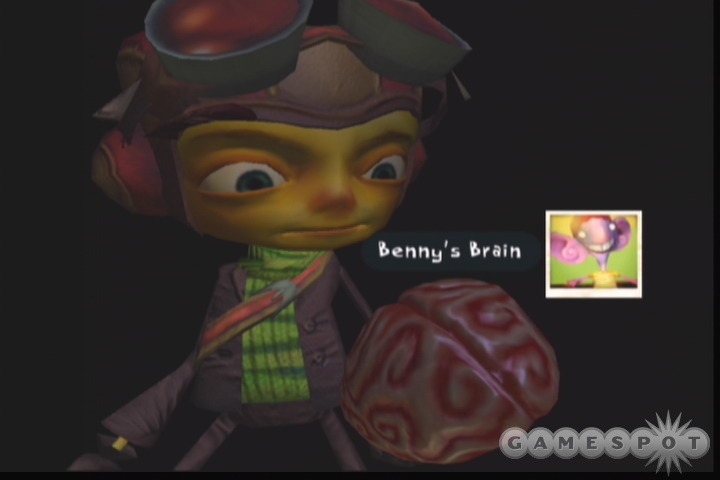Psychonauts is a quirky, offbeat game set in a special summer camp for clairvoyant kids, in which a group of psychic children end up in a wacky adventure filled with brain-stealing hijinks, psychic secret agents, and a little romance on top of everything else. It's rooted in the sorts of 3D platforming sensibilities we've all come to know over the years. But there's a spin to the game--its psychic theme--which adds some cool puzzle-solving to the usual platform-jumping and swinging associated with the genre. Psychonauts also bears the unmistakable mark of designer Tim Schafer (known for classic adventure games Grim Fandango, Full Throttle, and Day of the Tentacle), thanks to a hilarious array of peculiar characters and a story that never fails to entertain. Psychonauts doesn't reinvent the platformer, but it still delivers an experience that feels wholly original in every aspect of its execution.

The heart and soul of Psychonauts is Razputin--or, Raz, for short--a big-headed, goggle-sporting psychic prodigy who sneaks his way into a mysterious summer camp that happens to be a training ground for the titular psychonauts, a group of psychic secret agents. Raz, it seems, has run away from his home in the circus and wants to become a psychonaut himself. Grudgingly, the counselors of the camp accept Raz into the group (albeit only for a day, until his father can come get him and take him home). However, it doesn't take long for strange things to start happening around camp. Raz, as well as other children, find that they're suffering from similar nightmares. Strange psychic interference seems to be popping up all over the place, and not long after that, the brains of the other campers start disappearing, leaving the campers as soulless, TV-obsessed husks. As the hero of the story, Raz is on a mission to solve these various mysteries and uncover the crazy conspiracy behind it all.
The basic plot itself reads like typical platformer fodder, but there's a lot more to Psychonauts' story than can be summed up in a single paragraph. This is largely due to the game's bizarre cast of characters, of which there are many. Raz himself is a highly likable hero; he's cute, heroic, funny, and also a little awkward at times. He fits the bill of the overenthusiastic yet not-quite-ready hero to the letter and it's hard not to feel sympathetic to his plight. But beyond Raz, there's a great supporting cast, with roughly two dozen other characters who play parts both large and small in the story. The counselors consist of Coach Oleander, an overly aggressive drill sergeant; Milla Vodello, a somewhat ditzy and party-happy go-go girl; Agent Nein, a pale-skinned, sweater-sporting scientist of indeterminate Eastern European origin; and Ford Cruller, a mysterious old man who seems to exist in about eight different places at once. These counselors join the crazy array of campers, as well as other strange people and creatures you'll encounter, to drive the storyline, and thanks to the game's excellent design, you'll have no shortage of opportunities to get attached to them.
Initially, Psychonauts feels like a very open-ended game, especially because upon your first venture into the camp area, you'll find yourself able to just wander around, chatting it up with other campers or even just listening in on their completely insane conversations. The camp and its many areas make up a hub world, where you can access lots of different things, including a camp store, where you can buy helpful items, an underground tram that cuts down on backtracking, and all sorts of little hidden areas that yield bonus items. However, the biggest boon for the camp world is all the little bouts of dialogue you can discover. Depending on what stage of the game you're at, the conversations change up quite a bit, meaning you're not often going to hear a lot of repeats. This is great, especially because there's just so much of the dialogue. In some instances, you can literally just stand next to a pair of characters while they converse for about five minutes or longer and never hear the same line twice. And it's almost always really funny stuff.
However, the most interesting aspects of Psychonauts' characters don't come from their real-world conversations, but rather from their internal monologue. As Psychonauts revolves around a bunch of psychics, the bulk of your time will be spent traversing the perils of people's minds. This is where Psychonauts truly shines. You'll be able to enter the minds of more than a dozen different characters in the game, and each mind serves as one of its main levels. Each level is completely unique. For instance, when you enter the head of Coach Oleander, you'll find a war-torn landscape filled with constant explosions, plants made out of ammunition, and, for reasons not immediately apparent, lots and lots of meat. In another example, you enter the mind of a crazed security guard named Boyd Cooper, who is utterly obsessed with nonsensical conspiracies and someone called "The Milkman." His mental landscape looks like a 1950s-era suburban neighborhood that's been picked up by a pair of hands, twisted into a topsy-turvy fun house, and occupied exclusively by shadowy agents in trench coats who try to convince you that they're just simple street workers, or hedge trimmers, or grieving widows, despite their obviously ulterior motives. It's all totally weird, but also undeniably unique.
No two minds are exactly alike in Psychonauts, both aesthetically and in terms of gameplay. Granted, you will be spending at least some of your time in each level engaging in the usual platforming shenanigans, like jumping and double-jumping over platforms, swinging from poles, walking tightropes, and so on. When the game is in full-on platformer mode, it plays very well. The controls are tight, the camera is rarely ever a problem, and it's generally pretty easy to get Raz around without screwing up, at least on the Xbox. The PC version controls well enough too, provided of course you have a good USB controller, as the keyboard and mouse controls just don't feel right for this type of game (and even with a USB controller, camera control can be a bit of a pain). If there's any one criticism to be mounted here across both platforms, it's that the game is rarely ever that difficult, save for a few specific parts that are actually quite tough. You can't call the game a total breeze, either, but most experienced players shouldn't have any problems mastering the basic play mechanics pretty quickly.

Even though the game isn't particularly hard, at least it's not repetitive. The goals and challenges of each level are totally exclusive. In one level, you'll find yourself playing a bizarre board game against a mental projection of Napoleon Bonaparte. You'll shrink down to "fun size" to recruit new pieces to your cause, and then you'll return to your normal size so that you can move them around. In another level, you're fighting neon-tinted luchadores and a big, hulking bull in what looks like a velvet painting of a congested Spanish city. It's with this kind of variety that Psychonauts manages to achieve its high level of quality.
It also helps that the game has more to it than just a lot of jumping around. There are puzzles to be solved in Psychonauts, as well as battles to be fought, and both require use of Raz's list of crazy psychic powers. You start out only with a basic melee attack at your disposal, but as you play and collect items scattered about both the real world and mental worlds, you'll be able to upgrade Raz's rank and earn new powers, like telekinesis, pyrokinesis, levitation, invisibility, and clairvoyance. The best part is that there will be crazy situations constantly thrown at you where you'll have to change your powers regularly (as you can only have three assigned at one time). Got a piece of wood in front of you that's blocking your path? Just set it on fire with your mind. Need to get an object from one place to another? Just get your telekinesis on. Again, the game itself is rarely all that difficult, so it's not like you'll have to work too hard with these abilities to beat enemies or solve puzzles, but they're a lot of fun to play around with, regardless.

Psychonauts' main story isn't exceptionally long, and it should take players somewhere between 10 to 15 hours to finish the game. However, if you're the kind of player that likes to dig around and find hidden stuff, or just get 100 percent on everything, then Psychonauts could certainly provide you with a much longer experience. The game is chock-full of scavenger hunt items, crazy unlockable memories from each entered mind, collectible figments, and all sorts of other nutty stuff that will likely take you a long time to find and will also help you upgrade Raz a lot quicker. Plus, there are all sorts of random dialogue and story bits to be found everywhere. You'll get pretty much all you need to out of the story if you just stick to the straight and narrow path of the main plot, but you won't see it all.
Psychonauts' greatest achievement, perhaps unsurprisingly, is in the realm of its presentation. Graphically, this is one of the nicest-looking platformers on the Xbox or PC. The whole game has a remarkably polished look to it. The characters animate smoothly, the textures and set pieces all look excellent, and the game almost always performs well, with nearly no slowdown or other such problems to speak of. However, pure performance isn't where these visuals shine; artistry is really where they come together. The whole look of the game feels like the unholy love child of Tim Burton and a Pixar animation team, and it's just wonderful stuff. Everyone has the sort of kooky, misshapen look of The Nightmare Before Christmas characters, and each are hysterical in their own way. We've already raved about how all the different environments, both real and cerebral, look totally unique and amazing, so we'll spare you any further details on the subject. There just aren't any other games of this type that look like Psychonauts does and it seems near-impossible not to fall in love with its sense of style.
The audio is another area where Psychonauts excels. None of these characters would be worth a spit if they weren't acted well, and thankfully, they're downright brilliant at times. Raz is voiced to perfection--to the point where you just couldn't envision another voice coming out of that kid's giant head--and every other character feels similarly on point as well. The fact that the dialogue is just so goofy and fun also helps. It's simply impossible to count all the chuckleworthy moments and the flat-out hilarious parts, as there are so many of them in this game. The soundtrack and sound effects are just as excellently produced. The music is so wonderfully suited to each specific environment that is just blends perfectly into the ambience of the level, like the Spanish flamenco that echoes off the walls of the velvet-painting level and the battle-charged theme of your fight against Napoleon. Though the sound effects rarely ever transcend the usual goofy sounds you'd hear in any given platformer, they all fit into the context of the game nicely and never sound out of place.

The one issue with the audio is that it does have its technical problems from time to time--mainly on the PC version. On our main test PC, we found that certain lines of dialogue, as well as some specific sound effects, just came across as much too quiet, like they were on a different audio channel that couldn't be turned up or something. We tried the game on another PC and found a different issue. The dialogue would actually slow to a crawl in some situations, making the characters sound like the spawn of Satan or something like that. The problem itself was infrequent enough (at least on our main test system) to where it didn't intrude on the overall play experience, but it certainly was annoying. The Xbox version had almost no technical problems at all, save for a couple of bouts with slightly off-kilter pauses where the soundtrack loops, as well as some occasionally overlapping dialogue. Otherwise, the audio is pretty much perfect.
Especially for a game that has gone through four-plus years of development and two publishers, Psychonauts turned out remarkably well. It's pretty evident where all that development time was spent, as each and every moment just seems so carefully crafted and polished, to the point where you can't help but feel a deep appreciation for the whole experience. Players looking for a stiff challenge or an exceptionally lengthy adventure won't find it here, and those who specifically want to play the game on the PC aren't going to get the best version of the experience. However, anyone just looking for a fun and whimsical adventure with a brilliant presentation and a fantastic story will find just that in Psychonauts.



